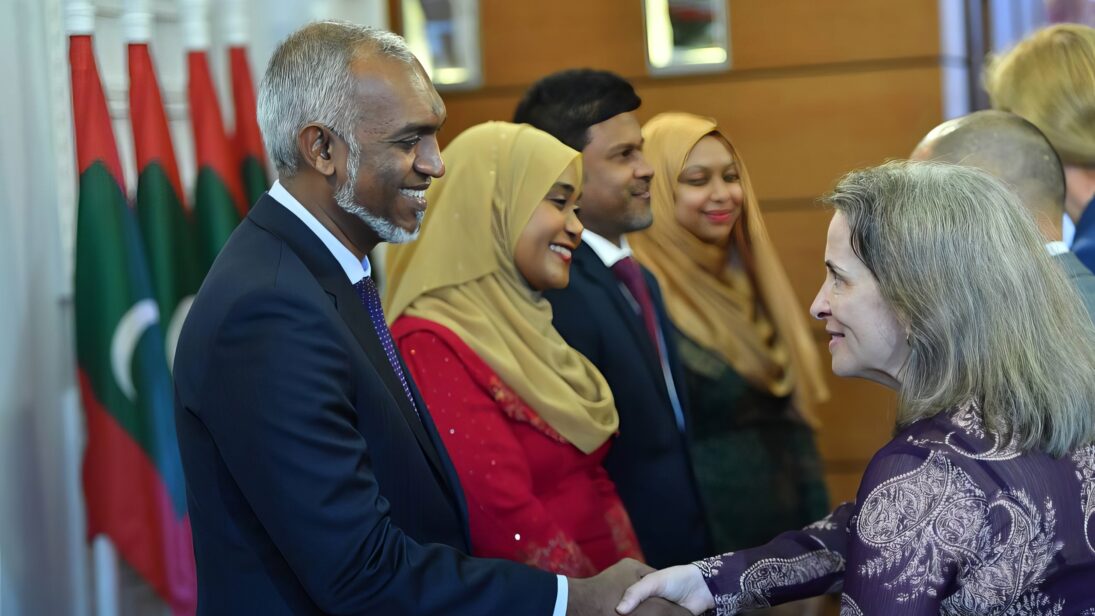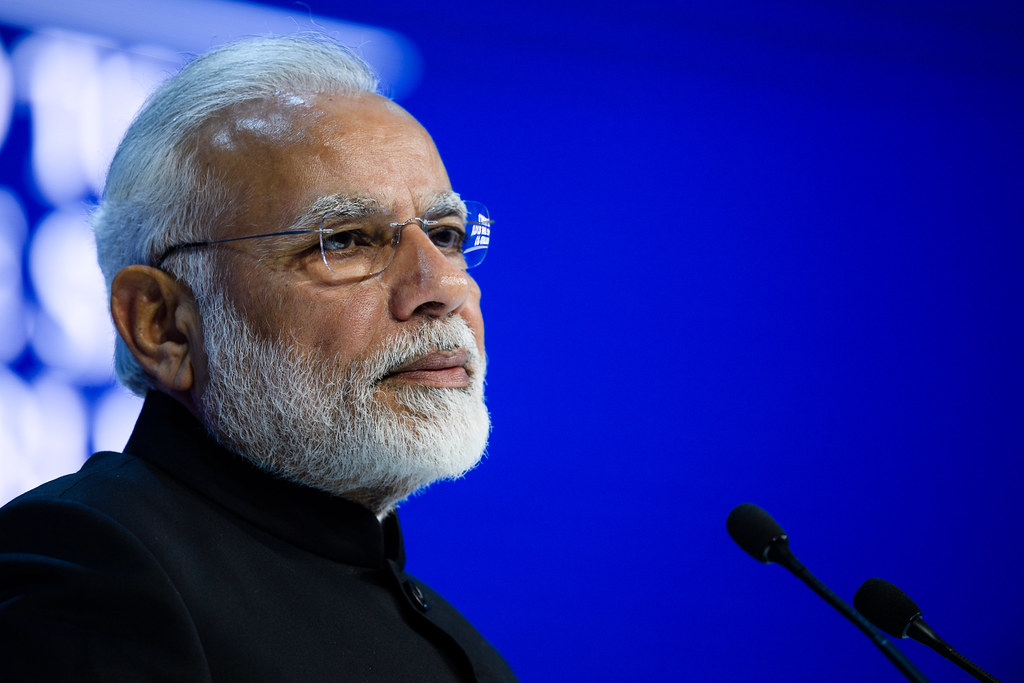
by Rakshith Shetty
The Maldives, often depicted in the news as a tropical paradise, recently had a less idyllic appearance in the headlines. President Mohamed Muizzu’s government ruffled feathers in New Delhi by asking India to withdraw its military personnel by March 15, 2024, using their recent high-level core group meeting to deliberate upon a “mutually workable solution.” To persuade voters, Muizzu built on the “India Out” campaign, which portrayed the presence of Indian personnel as a threat to Maldivian sovereignty. He promised to remove Indian troops from the Maldives shores and balance trade relations with India, which he claimed were heavily tilted toward India’s favor. Muizzu’s new “Pro Maldives” strategy led to him win the elections with 54 percent of the votes in September 2023. Malé recently scrapped a key pact involving a water survey, and Muizzu chose China for one of his first overseas visits in January after becoming president. There, he signed 20 agreements, including one on tourism cooperation.
A major catalyst for the deteriorating ties was the recent diplomatic spat on X (formerly Twitter) between India and the Maldives. It began after Prime Minister Narendra Modi visited Lakshadweep and posted on X about the beauty of the islands. The same day, hundreds of right-wing handles and BJP supporters began trending Lakshadweep and putting down the new ‘Chinese puppet government’ of the Maldives. Soon, many Maldivians retaliated by defending their country. The situation escalated when three Maldivian officials went a step further to mock the Indian Prime Minister. Deputy Minister of Youth Empowerment Mariyam Shiuna tweeted that Modi was a “clown” and a “puppet” of Israel. The initial provocation was from the Indian right-wing, which could have simply promoted Lakshadweep but chose to simultaneously disparage the Maldives.
While Malé contained the damage by suspending the three leaders, the strained relations have led to growing calls in India to boycott the Maldives as a tourist destination. Given the mutual importance of the relationship, India should exercise restraint domestically, emphasize shared regional interests, and sustain its role as the first responder for the Maldives in times of crisis. Simultaneously, the Maldives should issue a stronger statement against the remarks on Modi and foster a balanced foreign policy approach, leveraging its strategic location for economic development to restore bilateral ties.
Approaching 60 Years of the India-Maldives Partnership
The current situation puts the diplomatic and political relationship between India and the Maldives at stake, which has been meticulously cultivated over six decades. Since the British relinquished control of the islands in 1965, India initiated diplomatic ties, establishing an ambassadorial representative in 1980. Over the years, India has invested significant effort in networking with the local population, establishing itself as the preferred destination for many Maldivians, especially for education and medical purposes. India is the primary source of higher education for Maldivian students through scholarships and enrollment in Indian institutions.
India is the Maldives fifth-largest trading partner and the Maldives relies heavily on India for trade, as well as the provision of rice, fruit, and medicine. Between 1995 and 2021, India’s exports to Maldives grew at an annualized rate of 10.4 percent, from USD $31.6M to USD $416M, while Maldivian exports to India rose at an annualized rate of 22.9 percent, from USD $230,000 to USD $48.8 million.
India has always reinforced its credentials of being the Maldive’s “first responder” in times of crisis. In 1988 for instance, India conducted Operation Cactus, a military intervention that responded to a coup attempt by Sri Lankan Tamil mercenaries, and which underscored India’s commitment to preserving stability in the Maldives. India was also the first to assist the Maldives during the 2004 tsunami in which nearly 100 people were killed. The Indian Navy delivered food and medicines, treated patients in a field hospital set up by their medics, undertook repair of electricity generators and communication equipment, and evacuated victims. In 2014, amidst the Maldives’ drinking water crisis, the Indian Navy delivered 374 tons of bottled water within half a day of the government’s pleas for assistance as part of Operation Neer. Since 2019, Indian personnel have conducted more than 500 medical evacuations, saving 523 Maldivian lives. India contributes to Maldives’ infrastructure development too by providing construction material, and significant projects like the 300-bed Indira Gandhi Memorial Hospital. During the COVID-19 pandemic, food, medications, assistance teams were provided too.

India needs the Maldives for strategic and maritime security due to its proximity to the Indian island of Lakshadweep and to the Indian mainland’s western coast. Its location vis-a-via commercial sea lanes through the Indian Ocean gives it further significant strategic importance. Defense and security have, therefore, been a crucial area of cooperation between India and the Maldives since 1988, which was further consolidated after the signing of the Action Plan for Defense in April 2016. Approximately 70 percent of the Maldivian defense training is conducted by India. This collaboration includes training over 1,500 Maldivian National Defense Force personnel and providing aircraft and helicopters for aerial surveillance. Capacity-building through joint exercises and disaster management have also been part of their defense cooperation.
Sino-Indian Rivalry and the Maldives
The Maldives has also strengthened its collaboration with China by entering into various economic and defense agreements. Muizzu made a pitch for greater foreign direct investment (FDI), trade, and tourism at the “Invest Maldives” forum in Fuzhou, China in January 2024. Notably, he announced his administration’s intent to implement the Maldives-China Free Trade Agreement (FTA), which did not enter into force in the previous administration. Muizzu seeks Chinese investments to expand Maldives’ main airport and develop a commercial port.
Within India, this visit and Muizzu’s decision to elevate Maldives-China bilateral relations to a comprehensive strategic cooperative partnership are seen as coming at India’s expense. Indian observers are concerned by the implications of the 20 agreements signed between Maldives and China that span a variety of cooperation areas such as tourism, fisheries, digital economy, and disaster risk reduction. Therefore, Indian policymakers and strategists are concerned that the Chinese People’s Liberation Army (PLA) could have a steady presence in the Maldives in the future.
Although Muizzu says that removing Indian military personnel doesn’t mean allowing in another state’s soldiers, if Malé elects to increase PLA access, India will have few preventative options available. China holds over 60 percent of the Maldives’ sovereign debt, and an intentional economic withdrawal by India might trigger a backlash, potentially pushing the Maldives to depend more on China. It would also likely alienate the local population, thereby reducing the influence of political elites that favor closer ties with India.
A better path for India-Maldives ties?
Recently, a Chinese Research Vessel Xiang Yang Hong 3, docked at a Maldivian port after being permitted by the Malé government to make a port call for replenishment. The Indian Navy had concerns about the nature of the data generated by Chinese research activities in international waters, and pointed out that the data collected often has dual use applications in both civilian and military sectors. Overlooking the India-Maldives strategic relationship poses the risk of driving the Maldives into increased economic dependence on China—an outcome India cannot afford given the broader geopolitical implications and regional stability concerns.
A constructive way forward for the India-Maldives partnership could entail reducing tensions and recognizing that diplomatic relationships are shaped by shared and sustained interests. As the Maldivian opposition leader Fayyaz Ismail suggested, the government should come up with a stronger statement or action against the remarks on the Indian Prime Minister, and the Indian counterparts should attempt to restrain and diffuse the situation at home. Despite the controversy, India must continue to be the first responder for the Maldives and should not economically decouple from the island nation.
source : southasianvoices
